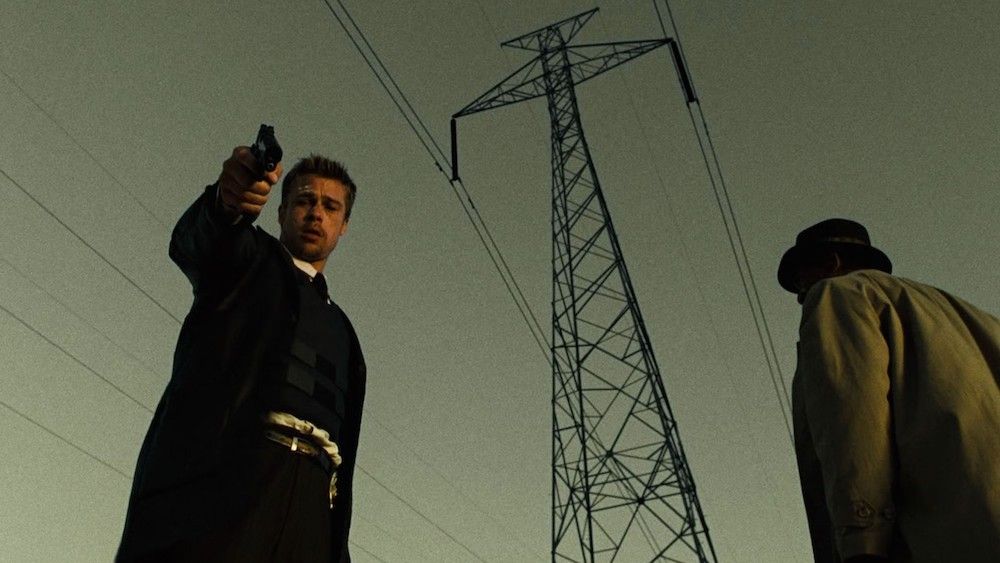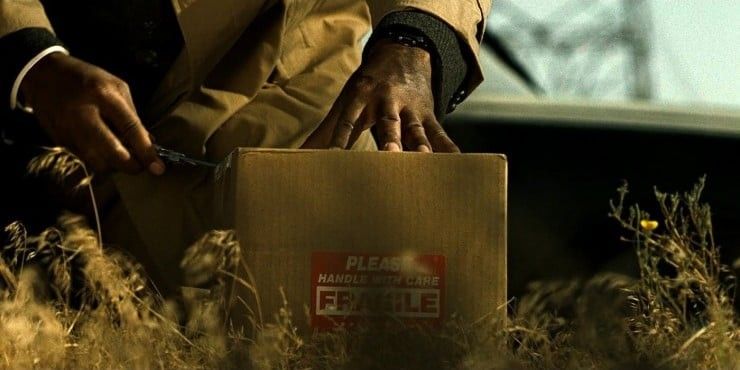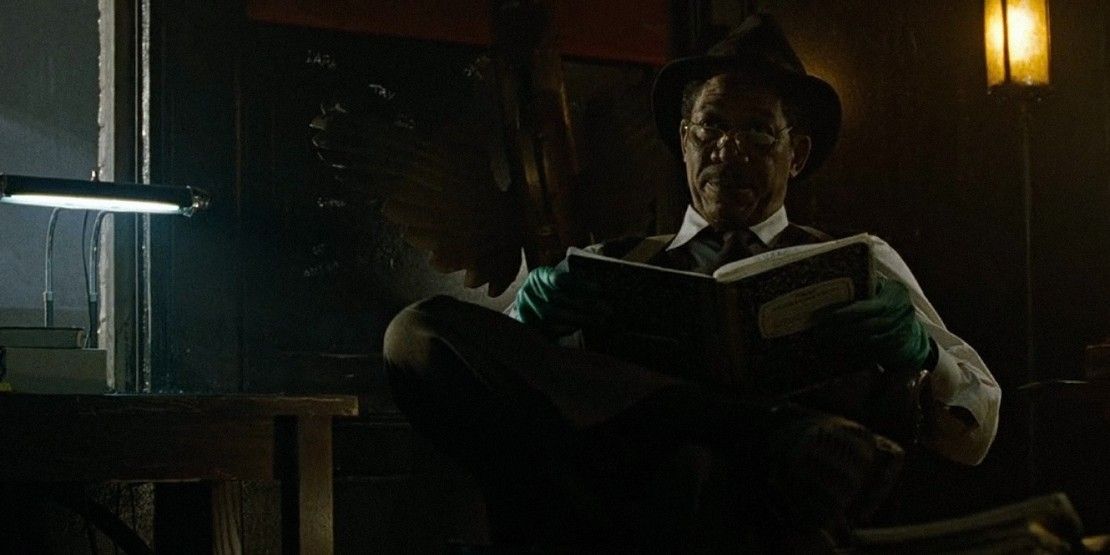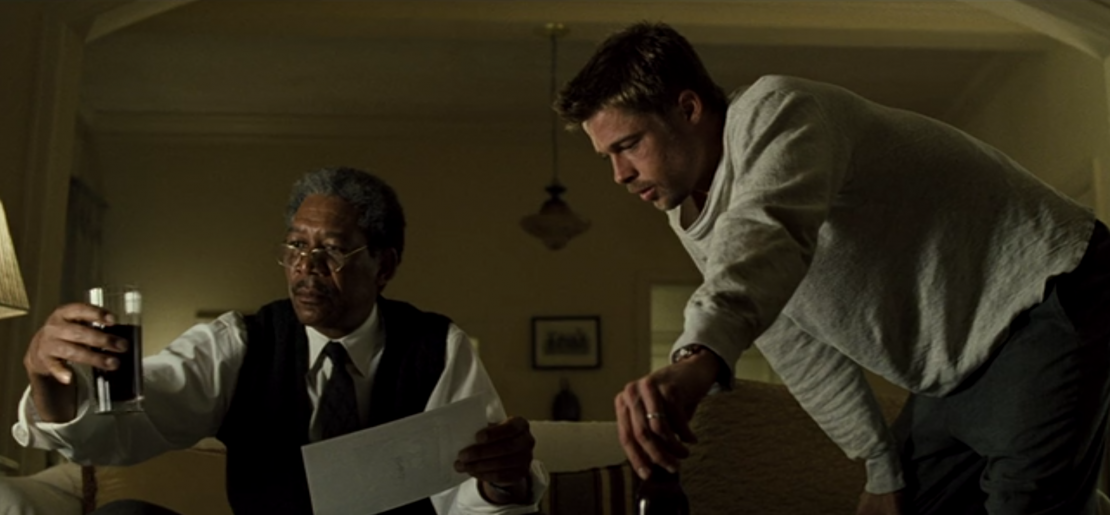
Dig deep into the ending of Se7en and decide if the world is a fine place or not.
I envy everyone who was able to see David Fincher's Se7en in theaters blissfully unaware that there would be a remarkable twist. I saw the movie knowing to expect something, and while I was still left in shock, I cannot imagine being blindsided by the film.
Upon its release, Roger Ebert called Se7en "one of the darkest and most merciless films ever made in the Hollywood mainstream." And I have to agree. The movie is unrelenting. It rains for most of it, and the dead bodies seem to fall from the sky with that rain.
It's complicated, smart, and emotional. It's one of the best screenplays of all time.
Every character is given a moral choice, and it seems like no one truly understands if they are making the right decisions. At one point, a theory is posed to us: "The world is a fine place, and worth fighting for."
We believe it for a moment, but the movie's ending seems to say otherwise.
Today, I want to discuss the ending, look at some theories, and go from there.
Check out this video from The Take and let's chat after the jump.
Does the Ending of Se7en Mean Evil Wins?
This is going to be a bleak article, but hey, sometimes we have to get down and dirty.
First, let's go over the ending. Se7en ends on a twist where serial killer John Doe reveals he's murdered Tracy (Gweneth Paltrow), the pregnant wife of detective Mills (Brad Pitt). Mills had no idea she was pregnant, and after the reveal cannot stomach the fact that his entire future and dream life has been slaughtered.
Doe has her head delivered in a cardboard box to prove he's not lying.
The box is apprehended by Detective Somerset (Morgan Freeman), who rushes from the evidence to Mills to try to calm him down while Mills yells, "What's in the box?!"

Doe reveals he is Envy. He wants Mills to kill him, thus making the detective Wrath, the final sin in Doe's design of a perfect seven kills.
Unable to overcome his grief and anger, Mills kills Doe and fulfills the final act of the killer's master plan.
This is not a triumph or punishment, as good is defeated by evil.
That lives up to the Ebert quote. In fact, the ending is so miserable that the studio wanted to change it, but Fincher compromised, offering a voiceover from Morgan Freeman over the final shot.
In the voiceover, Somerset reads a passage from Ernest Hemingway, saying, "The world is a fine place, and worth fighting for." Sommerset muses that he does not believe the first part of the quote but does believe the second.
Let's refocus on that scene once again.
"What's in the box?"
Maybe one of, if not the, most tense scenes in film history has to be when Somerset and Mills take John Doe out to the middle of nowhere... and receive a package.
This is a standoff between the bad guy and our heroes. The line "What's in the box?" is one of the greatest of all time.
It sums up the entire movie. Our characters succumbing to the realization that they have lost. That "what's in the box" makes Doe the winner.
It's also a test. Mills needs to know. He needs the only person he trusts to tell him the truth. Somerset knows the truth will only make things worse.
That's the theme of this movie. Is the world a good place or a bad place? Are we all good or do we all have evil inside of us?
This ending has been famously toyed with. Fincher played with different versions, and so did Andrew Kevin Walker.
Kudos to them, because the one we got was perfect.

What does the ending of Se7en mean?
Somerset is a jaded detective who thinks cops just work within the madness raging around him. Mills is more of an optimist. He thinks they can follow the clues and stop the bad guys. At the end, Mills has his entire world crash down upon him, and Somerset knows he can't compartmentalize this trauma, he can just deal with it.
Tropes within the genre do not prepare us for this ending. Instead, we have the rug ripped from under us. We were certain everything will be okay, but now we know it won't. The world, like Mills' apartment or the weather, doesn't just have a storm or train that eventually stops.
It has evil we have to engage with directly.
In Roger Ebert's retrospective on the film, he wrote, "When Se7en was released in 1995 the ads, posters and opening credits didn't mention the name of the actor, and although you may well know it, I don't think I will either. This actor has a big assignment. He embodies Evil. Like Hannibal Lecter, his character must be played by a strong actor who projects not merely villainy but twisted psychological complexities. Observe his face. Smug. Self-satisfied. Listen to his voice. Intelligent. Analytical. Mark his composure and apparent fearlessness. The film essentially depends on him and would go astray if the actor faltered. He doesn't."
We have to engage with John Doe directly as they drive to the place where the box is delivered. We hear about his crimes and begin to understand his reasoning before it all unravels.
Se7en was never about catching a killer—it was about optimism versus pessimism.
So who wins?
Even though Fincher's preferred ending was just Mills staring and letting his world sink in, it's not the movie we got. The movie we got rests in Somerset's certainty that they keep fighting for this world, even if it is lost. Otherwise, our journey here is futile. In that way, we see Mills become Somerset, and Somerset become Mills.

So is this world capable of redemption?
Somerset's Hemmingway line offers only a bleak consolation. But his actions offer a lot more. According to his final scene with the captain, we see that Somerset is not willing to give up. That he might not actually retire, but will stick with the city as a cop. He'll be "around" to make sure Mills gets good care, and he'll carry on with human connection that produces light to keep us going.
The end of Se7en shows that the world may not deserve our efforts, but without them, humanity and living fall into hopelessness. To be human, to make your life matter, you cannot give in to the evil of the world, no matter how much it pulls on you.
But that's easier said than done. Especially if you've seen what's in the box.
What did you think of the end of Se7en?
Let us know in the comments.
What's next? Get our free screenwriting eBook!
So much of what we're talking about on No Film School when it comes to screenwriting is summarized in our new eBook. It also helps guide you through a 10-week writing plan that will get your script actually finished.
Your Comment
5 Comments
Who wins in Seven? The serial killer is ended. One not so good cop is locked. And there is many good cops and people left to live and prosper.
December 8, 2020 at 11:40PM
I take such serious issue with every aspect of your comment here.
First of all, "one not so good cop"? If anything, Pitt's character is presented in a way that suggests he's earnestly motivated with the best of intentions by a moral compass more than any other character — or, at least, most resolutely. Yes, he extrajudicially executes a multiple-murder suspect while in detainment, but it isn't a premeditated act nor is it without severe provocation during the most understandable of circumstances. I surely wouldn't say that such warrants the criticism of being a "not so good cop" in the sort of a simplistic and dismissive way in which you put it.
Second, to say "the serial killer is ended", as if that solves the larger issue of his crimes and thereby washes the burden of him and his actions away from society, suggests that you didn't pay enough intention or attach enough significance to the fact that John Doe's intention from the start was to be killed in order to finalize his seven deadly sins 'project'. His death accomplishes nothing relevant to the narrative of the film in its contained, finite series of events other than allowing his plans to be finished as he admittedly wished for them to be all along.
Lastly, it comes off as very naive for someone to walk away from the film still clinging on to a kind of myopically constructed optimism regarding all of the imagined, hypothetical people who we're never introduced to or even given a glimpse of and blissfully expecting that they're living in prosperity and/or complete harmony outside of the film's portrayed reality. Quite literally the only identifiable, dynamic, and likable character outside of the main protagonist(s) is Gwyneth Paltrow's... and she ends up murdered and beheaded by the end of the film. Detective Mills and his wife are the closest thing that the audience gets to a representation of 'everyday people' within this world, and they're both irrevocably destroyed by evil. Perhaps their existence and eventual destruction is a microcosmic example of all humans' potential for suffering and defeat by the hand of evil — though, regardless of that subjective takeaway or not, you cannot argue that evil surely didn't win this particular battle as far as the story in and of itself is concerned.
On a much more personal note, I find it super odd how you seemed to focus on cops and the assertion of their predominant goodness when summarizing this film as a whole. It just reads as way too far off point and muddied by topical distractions.
November 1, 2021 at 2:49PM
Yes, in the film "Seven" evil wins. Because, sometimes...evil wins.
December 9, 2020 at 9:09AM
Nice film!
February 8, 2021 at 8:47AM, Edited February 8, 8:47AM
A phenomenal piece here, Jason Hellerman. Very well written and insightful
November 1, 2021 at 3:07PM